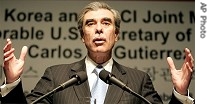2006年VOA标准英语-Senior US Trade Official Warns 'Clock Is Tickin(在线收听)
By Kurt Achin
Seoul
12 December 2006
On a visit to South Korea, U.S. Commerce Secretary Carlos Gutierrez says he is confident that Washington and Seoul can conclude a deal to liberalize trade with each other - but warns the negotiations must speed up. VOA's Kurt Achin reports from Seoul.
 |
| Carlos Gutierrez speaks during lunch meeting hosted by American Chamber of Commerce in Korea, 12 Dec. 2006 |
"The problem is that the clock is ticking - and we don't have a lot of time," he said.
The two countries have been negotiating since June, and are struggling to overcome obstacles before President Bush's authority to submit it to Congress for a simple yes-or-no vote expires in June 2007.
The agreement aims to make it easier for the United States and South Korea to buy each other's good and services. Supporters say it will boost the already robust trade relationship of more than 70 billion dollars a year, creating new jobs and wealth on both sides.
However, Gutierrez warns that the chances of passing a deal remain low unless Seoul does more to open up South Korean markets.
"We simply cannot convince the U.S. people or our Congress that an F.T.A. is a good idea if it is not deemed, or if it is not felt, that it is a fair deal," he said.
Last week's U.S.-South Korea trade talks in Montana sputtered over two main issues of market access - pharmaceuticals and automobiles.
Gutierrez says South Korea's health care system protects domestic drug producers by limiting drug reimbursements almost exclusively to South Korean medicines.
He says Seoul must also do more to give South Korean consumers a choice of which cars to drive.
"Korean car taxes continue to discriminate based on engine size," he said. " In 2005, Korea sold nearly 800,000 vehicles in the U.S., yet U.S. companies sold just over 3,000 in Korea."
South Korean authorities have their own concerns. Negotiators here are under intense political pressure to protect domestic agriculture, widely seen as a key component of the national character. They also say Washington unfairly targets South Korean producers with its rules against dumping - or selling exports below cost to grab overseas market share.
Another recent cause of friction is South Korea's handling of U.S. beef imports. Seoul has halted three separate shipments of U.S. beef in recent weeks after finding tiny fragments of bone.
Gutierrez implied South Korean concerns are excessive.
"U.S. beef is perfectly safe. The beef that we export to many, many countries around the world is exactly the same beef that we eat in the United States," he said.
U.S.-South Korea trade talks enter a sixth, and most likely final, round here in Seoul next month.